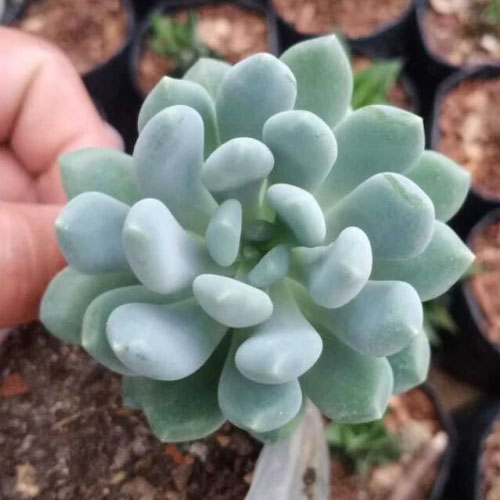Vishnu Kamal
Vishnu Kamal, also known as "Vishnu Lotus" or "Vishnu Plant", is a plant often associated with spiritual and religious significance in Indian culture. It is sometimes confused with similar plants like the "Laxmi Kamal". Here’s a detailed overview of Vishnu Kamal:
Description:
- Botanical Name: Echeveria elegans
- Common Names: Vishnu Kamal, Mexican Snowball, Ghost Plant
- Appearance: Vishnu Kamal, or Echeveria elegans, is a rosette-forming succulent with fleshy, light green leaves that can take on a slightly pinkish hue at the edges. The plant forms compact rosettes of leaves that resemble a lotus flower, which is why it’s often associated with the term "kamal" (meaning lotus in Sanskrit).
Symbolism:
- Cultural Significance: In Hindu culture, Vishnu Kamal is often revered for its resemblance to the lotus flower, which is a symbol of purity and divine beauty. It is associated with the god Vishnu and his attributes, symbolizing prosperity, good fortune, and spiritual growth.
Growing Conditions:
- Climate: Vishnu Kamal thrives in a range of climates, but it is best suited to temperate and subtropical regions. It prefers warm temperatures and can tolerate cooler conditions, though it should be protected from frost.
- Soil: It grows best in well-draining soil. A cactus or succulent mix is ideal, as it helps prevent waterlogging and root rot. Soil should be slightly acidic to neutral.
- Watering: The plant is drought-tolerant and does not require frequent watering. Allow the soil to dry out completely between waterings. Overwatering can lead to root rot.
Cultivation:
- Propagation: Vishnu Kamal is easily propagated from leaf cuttings or offsets. To propagate, gently twist off a healthy leaf or offset, allow it to dry for a few days, and then plant it in well-draining soil.
- Planting: Plant the rosette in a pot with good drainage or in a garden bed with well-draining soil. It can be grown indoors or outdoors, depending on the climate.
- Maintenance: The plant requires minimal care. Regularly remove any dead or damaged leaves. It is generally pest-resistant but can occasionally be affected by mealybugs or aphids.
Uses:
- Ornamental: Vishnu Kamal is popular as an ornamental plant due to its attractive rosette form and symbolic significance. It is often used in home gardens, indoor pots, and decorative arrangements.
- Spiritual: The plant is valued for its spiritual and symbolic connections, especially in contexts related to Hindu religious practices and iconography.
Tips for Care:
- Pests/Diseases: Keep an eye out for common pests such as mealybugs and aphids. Treat infestations with appropriate methods if needed.
- Fertilization: The plant does not require frequent fertilization. A balanced, diluted fertilizer can be applied once or twice a year during the growing season.
- Temperature: Protect the plant from frost and extreme cold temperatures. It prefers temperatures above 10°C (50°F).
Vishnu Kamal, with its beautiful rosette form and symbolic associations, is a popular choice for both decorative and spiritual purposes. If you have any more questions about its care or cultivation, feel free to ask!


